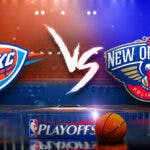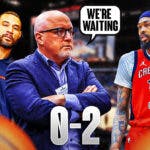The much-awaited restart of the NBA 2019-20 season brought along some sloppy play, exciting results, and a few questions surrounding the New Orleans Pelicans and their strategy concerning rookie Zion Williamson, who played only 15 minutes in the opener.
Perhaps the most dumbfounding part of this severe minutes limitation is that Williamson played ZERO crunch-time minutes, despite the game coming down to the wire and his status as a franchise-changing phenom.
Let's take a look at Zion Williamson's brief stints on the court and see what can be made of them:
First quarter: Start – 9:02 mark — 5 points, 1 turnover
Williamson scored the first basket for New Orleans, muscling in an and-1 finish and burying the free throw. He would chip in another layup from a Lonzo Ball assist.
The Pelicans stayed loyal to playing him in those planned three-minute bursts here, taking him out early in the first period.
Second quarter: Start – 8:23 mark — 4 points
Zion did not waste time, scoring on the first possession of the quarter. He closed out his short stint with an alley-oop finish from another Ball assist.
He would not re-enter until the second half.
Third quarter: Start – 8:06 mark — 2 points, 1 assist, 2 fouls
Williamson finished off another alley-oop, this time from Jrue Holiday. But his most impressive feat was this on-the-money behind-the-back assist to Ball:
BEHIND THE BACK 😧@Zionwilliamson out here looking like a point guard on the feed to @ZO2_ pic.twitter.com/a8qkpNoD0k
— New Orleans Pelicans (@PelicansNBA) July 31, 2020
The rookie would depart shortly after.
Fourth quarter: Start – 7:19 mark — 2 points, 1 turnover
Williamson muscled his way to two more early in the fourth quarter, but had a tough time doing much else in what was the longest stint on the court — 4:41.
. . .
With that in mind, there's a few conclusions that can be made from each of Zion Williamson's stints on the court.
The Pelicans mostly stayed in line with the three-minute bursts, and they became more flexible with that regimen after every quarter, nearing almost five minutes in the fourth quarter.
Yet what's troubling is that their most dynamic talent only saw 15 minutes in a game that could prove pivotal to forcing a play-in tournament for the last playoff seed.
The Pelicans have been rumored to prioritize Williamson's health over their own playoff hopes, but the optics of making that so evident are just … poor.

Williamson looked perfectly healthy when he was on the court, but one could guess his personal time off from the Orlando bubble and his brief time practicing since returning from a four-day quarantine were reasons to pull him back a fair bit. He also was a minus-16 in his 15 minutes and struggled defensively, though it still would have been nice to see him on offense in the closing minutes.
The lone concerning thing is that the Pelicans are guilty of being “too careful” with Williamson. Three-minute bursts are conditions put on a player coming back from an Achilles tear or multiple knee injuries like John Wall or Derrick Rose in the past.
Doing so with a 20-year-old who was playing consistent 30-plus minutes before the season shut down makes it look like there was an underlying reason for being too careful.
It's worth noting that play at the end of close games is more physical, more demanding in terms of fatigue, and risky due to the importance of loose balls and battling for possession of the ball.
If the Pelicans are concerned about aggravating an injury, they surely did right by keeping him out of the last few minutes and keeping his minutes low. But doing a repeat of his actual debut against the San Antonio Spurs by keeping him out of the most vital moments of the game is robbing the fans of must-watch TV.
Whatever their reasoning is, the assumption is that the Pelicans will eventually increase Zion Williamson's workload and allow him to flourish the way he had been before the season came to a halt. They obviously know exactly what's going on with their star rookie, but a lack of transparency from Alvin Gentry and the organization only leads to questions about why a supposedly healthy young star played such a limited role in a crucial game.




